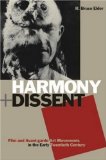Cinematography
English
  Dziga Vertov: Defining Documentary Film (KINO - The Russian Cinema). By Jeremy Hicks. I. B. Tauris, 2007. Paperback, 224 pages. Dziga Vertov: Defining Documentary Film (KINO - The Russian Cinema). By Jeremy Hicks. I. B. Tauris, 2007. Paperback, 224 pages.
"…the first English-language monograph devoted entirely to the career of Russia’s greatest documentary filmmaker…a valuable contribution to English-language scholarship on early Soviet cinema and an important resource to all those of us who teach the history of Russian or documentary cinema…" (Anthony Anemone, Slavic and East European Journal)
  Harmony and Dissent: Film and Avant-garde Art Movements in the Early Twentieth Century (Film and Media Studies) by R. Bruce Elder. Wilfrid Laurier University Press, 2008. Hardcover, 540 pages. Harmony and Dissent: Film and Avant-garde Art Movements in the Early Twentieth Century (Film and Media Studies) by R. Bruce Elder. Wilfrid Laurier University Press, 2008. Hardcover, 540 pages.
R. Bruce Elder argues that the authors of many of the manifestos that announced in such lively ways the appearance of yet another artistic movement shared a common aspiration: they proposed to reformulate the visual, literary, and performing arts so that they might take on attributes of the cinema. The cinema, Elder argues, became, in the early decades of the twentieth century, a pivotal artistic force around which a remarkable variety and number of aesthetic forms took shape.
To demonstrate this, Elder begins with a wide-ranging discussion that opens up some broad topics concerning modernity’s cognitive (and perceptual) regime, with a view to establishing that a crisis within that regime engendered some peculiar, and highly questionable, epistemological beliefs and enthusiasms. Through this discussion, Elder advances the startling claim that a crisis of cognition precipitated by modernity engendered, by way of response, a peculiar sort of “pneumatic (spiritual) epistemology.” Elder then shows that early ideas of the cinema were strongly influenced by this pneumatic epistemology and uses this conception of the cinema to explain its pivotal role in shaping two key moments in early-twentieth-century art: the quest to bring forth a pure, “objectless” (non-representational) art and Russian Suprematism, Constructivism, and Productivism. (editorial review from Amazon)
|

